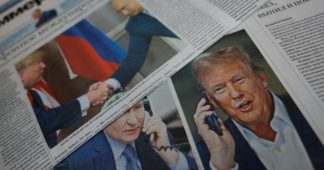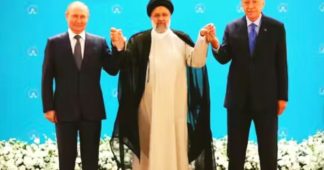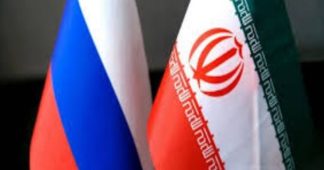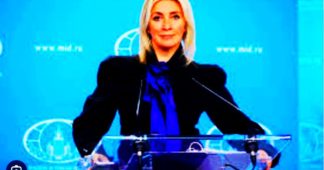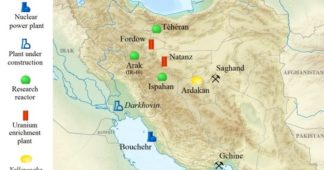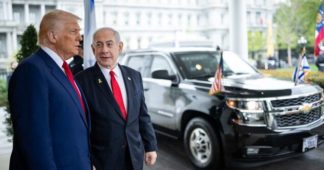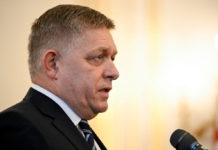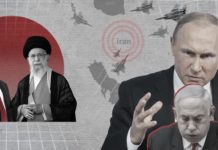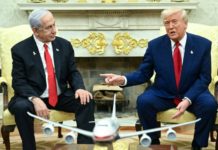Hazal Yalin
JUN 24, 2025
Tel Aviv’s defiance and Washington’s duplicity have shattered every last bit of Moscow’s illusions of diplomacy, forcing the Kremlin to reckon with the collapse of its balancing act in West Asia – and even Ukraine.
From the outset, Moscow condemned Israel’s aggression against Iran in sharp terms. The Russian Foreign Ministry’s first official statement left no ambiguity in assigning blame to Tel Aviv.
Until 20 June, Russia clung to the belief that a ceasefire could be brokered and that Washington would refrain from direct strikes on Iran. This optimism stemmed from a nearly hour-long phone conversation on 14 June, during which US President Donald Trump and his Russian counterpart, Vladimir Putin, discussed the escalating Israel–Iran conflict. Trump reportedly stated during the call, “this war in Israel–Iran should end,” a message echoed later on his Truth Social feed.
Kremlin aide Yuri Ushakov reported that US negotiators were open to returning to talks on Iran’s nuclear program. For Moscow, this was not merely optimism — it was interpreted as a real diplomatic overture and a potential backchannel for Trump to defuse mounting domestic and legal pressures.
From Moscow’s view: A timeline of misjudged hopes
This belief informed Moscow’s early posture. Even after Tel Aviv launched its unlawful strikes on Iran, the Russians avoided directly blaming Washington. Instead, they pinned principal responsibility on Israeli Prime Minister Benjamin Netanyahu’s far-right cabinet, denouncing Israel’s leadership while keeping communication channels open.
In his 18–19 June press conference with international media agencies – deliberately scheduled late at night to be picked up by US audiences – Putin emphasized ongoing direct lines with both Trump and Netanyahu. He pointed out that the attacks had only solidified Iran’s internal political unity and noted that the bombings did little to harm Tehran’s nuclear infrastructure, saying, “These underground factories remain intact. Nothing happened to them.”
Putin also made clear that a resolution was still on the table: a framework that could ensure Iran’s peaceful nuclear rights while addressing Israeli security concerns, and confirmed that Russia had presented these options to all three sides.
At the St. Petersburg International Economic Forum (SPIEF) – Russia’s premier annual business and diplomacy gathering – Putin reiterated Moscow’s diplomatic approach, noting that Russia had presented “some ideas” for a settlement to all sides. He also reaffirmed support for Iran’s right to peaceful nuclear development, referencing Russia’s ongoing construction at the Bushehr nuclear facility.
Putin stated that he had requested safety guarantees for Russian personnel there, and added, “Prime Minister Netanyahu has agreed with that, and President Trump has promised to support our legitimate demands.”
But that facade would collapse almost instantly. Shortly after Israel claimed it had targeted the Bushehr plant – only to later retract the statement, calling it a “mistake” – it bombed the city’s airport, destroying its international terminal.
The attack, less than 36 hours after public reassurances, was viewed in Moscow as a deliberate humiliation. It extinguished any remaining belief that Tel Aviv or Washington were operating in good faith.
Moscow’s tone hardened. UN Ambassador Vassily Nebenzia’s 20 June speech marked the last instance of diplomatic optimism:
“We are convinced that it is quite possible to forge a solution that would both respect Iran’s right to peaceful nuclear activities and ensure the unconditional security of the Jewish state. We have conveyed these options to our American and Israeli colleagues, as well as to our Iranian partners.”
After 22 June: Anger and reassessment in Moscow
Everything changed on 22 June. The US bombing campaign confirmed what many in Moscow had feared: that Washington was not only unwilling to mediate, but had used Russia’s overtures as strategic cover.
Russian political elites began to speak in stark terms. Andrey Klishas, head of the constitutional committee in the Federation Council, was blunt:
“The Islamic Republic will be compelled to respond to the violation of sovereignty and aggression against its country, because a regime that cannot defend the sovereignty of its state is always doomed.”
On 23 June, the influential Telegram news-analysis channel Yoj – with over 500,000 subscribers – reported that the Kremlin had quietly advised state television to avoid portraying Trump as a peace-seeking figure.
According to Yoj, Putin was still holding off direct attacks on Trump, but that could change. “If the president sees Trump as willing to use force against Russia over Ukraine, he will abandon restraint. That scenario, despite Trump’s talk of peace, is now considered entirely plausible within the Kremlin.”
Anger echoed through official channels. Russian Foreign Minister Sergei Lavrov’s statements were seething. UN Ambassador Nebenzia, speaking at the UN Security Council, declared, “Washington has once again demonstrated its total disregard for the position of the international community and confirmed that in defense of its Israeli ally it is prepared to wager the safety and well‑being of all humanity.”
Even Putin, typically cautious in foreign briefings, took an unusually blunt line during his 23 June meeting with Iranian Deputy Foreign Minister Abbas Araghchi. According to Iranian outlets Jamaran and Shabestan, Putin described the US airstrikes as “an unprovoked and unjustifiable aggression,” and emphasized that “the provocative aggression against Iran is without any basis or justification.”
The president’s spokesperson, Dmitry Peskov, was even more direct, hinting that Moscow would be prepared to deliver whatever Iran needed to counter this illegal and unprincipled war:
“We have offered our mediation effort, this is something concrete, we have declared our position, which is a very clear statement, a form of support for the Iranian side. From now on it all depends on what Iran needs right now.”
Asked whether Iran will be given Russian S-300 and S-400 air defense systems, Peskov suggested that Iran need only ask, stating, “It all depends on what the Iranian side and our Iranian friends say.”
Why the Iran–Russia ‘strategic pact’ falls short
The much-discussed “comprehensive strategic cooperation agreement” between Russia and Iran has turned out to be less than it appeared – particularly on military terms. While many assumed that Moscow was reluctant to deepen security ties, official Russian accounts suggest the opposite is true.
It was Iran’s parliament that delayed ratifying the agreement for nearly two months after Russia’s Duma passed it in late May. On 18 June, Putin – when asked by an AFP reporter whether Russia would supply new air defense systems to Iran – clarified that not only had Moscow offered to supply them, it had proposed co-production. Iran, he said, had so far not accepted and had not made any formal request.
Two days earlier, Duma Deputy Svetlana Zhurova told Russian media that while the pact included arms sales, military training, and intelligence exchange, Iran had refused any clause allowing deployment of Russian troops. She added. “Everyone sells weapons – that’s standard. But sending personnel? That’s outside the agreement.”
On 23 June, hours before Putin’s meeting with Araghchi, Duma Defense Committee Deputy Chair Alexei Zhuravlyov confirmed, “One should not expect a Russian expeditionary corps in Iran … the relevant clauses were removed from the Russian–Iranian agreement at Tehran’s request.”
Tehran has made no effort to contradict these statements. The evidence points to Iran setting clear limits – possibly to avoid appearing overly reliant on Russia, or to maintain maneuverability in the emerging multipolar order. Furthermore, while Iran’s constitution does not explicitly include a formal declaration of non-alignment, the concept of “neither east nor west” has been a central tenet of Iranian foreign policy since the 1979 revolution.
And although since the late Iranian president Ebrahim Raisi administration, Tehran has geared itself to primarily “Look east,” his successor appears to have boomeranged by opening indirect talks with the Americans. Given the colossal betrayals of trust displayed by the Trump administration since 16 June, however, current Iranian President Masoud Pezeshkian’s west-leaning options may have narrowed considerably.
Looking ahead: Can Moscow still build a regional axis?
An earlier analysis published in The Cradle argues that peace in West Asia would hinge on new alliances – and that even provocations by Tel Aviv might be tempered in the short term by mutual caution. That assumption has now collapsed. Washington’s actions, paired with Israel’s targeted escalation, have pushed the region into a far more volatile phase.
The only viable option now may lie in Moscow and Beijing pressing harder – with Persian Gulf states, and especially Saudi Arabia – to develop an alternative regional security framework.
While fragile, a few openings remain: Riyadh’s sharp condemnation of the Israeli attack on Iran, its public objection to Iran’s retaliatory strike aimed at US-linked bases in Qatar, its reluctance to align against Russia on Ukraine, and broader hedging behavior in West Asia may offer a narrow path forward.
That said, the ruins of Syria still cast a long shadow. There is little certainty that Moscow can convert tactical understandings into strategic alliances. However, without such a shift, the path forward leads not to de-escalation, but to an even broader regional war.
Read also: On the Russian role in the Iranian crisis
We remind our readers that publication of articles on our site does not mean that we agree with what is written. Our policy is to publish anything which we consider of interest, so as to assist our readers in forming their opinions. Sometimes we even publish articles with which we totally disagree, since we believe it is important for our readers to be informed on as wide a spectrum of views as possible.
